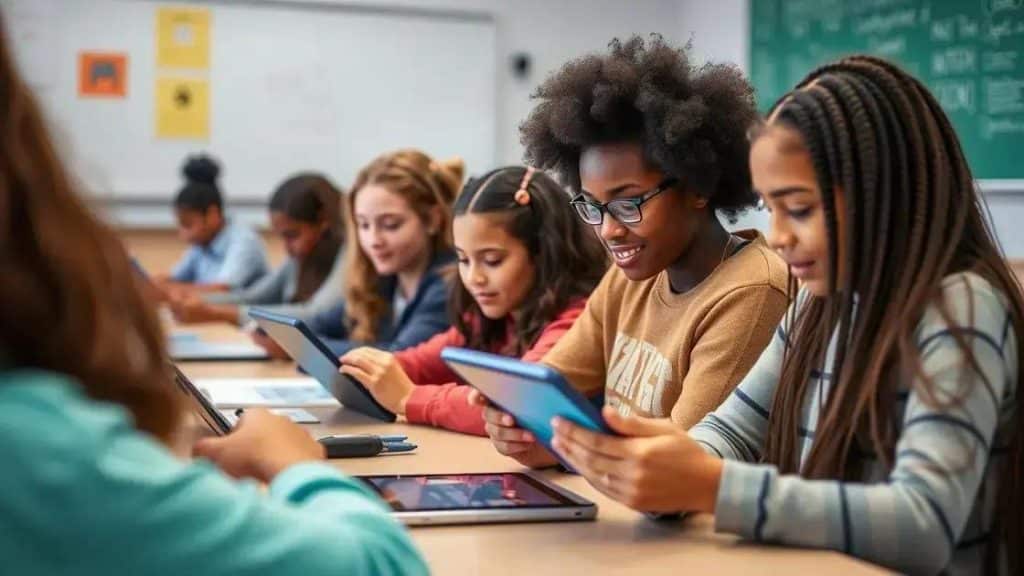Adaptive learning software: transform your learning experience

Adaptive learning technology personalizes education by using data and algorithms to tailor learning experiences, ensuring that each student receives content suited to their individual needs and learning styles.
Adaptive learning software is reshaping the educational landscape by creating personalized experiences for each learner. Have you ever wondered how technology could tailor learning to fit your needs? Let’s explore this innovative approach!
Understanding adaptive learning software
Understanding adaptive learning software is essential for anyone interested in modern education technologies. This type of software personalizes the learning process for each user, making education more effective. But how does it really work? Let’s break it down.
What is Adaptive Learning Software?
Adaptive learning software uses algorithms to tailor educational content to individual student needs. Instead of a one-size-fits-all approach, it assesses each learner’s strengths and weaknesses. By doing this, it helps students to progress at their own pace.
Key Features
- Personalized learning paths: Students receive material suited to their skill level.
- Real-time feedback: Instant assessments keep learners informed about their progress.
- Analytics: Teachers can track student performance and adjust instruction accordingly.
This intelligent system creates a dynamic and engaging learning environment. By addressing each student’s needs, adaptive learning software enhances retention and understanding. For instance, if a student struggles with a particular concept, the software will offer additional resources and exercises to reinforce that area.
Many schools and educational institutions are starting to adopt adaptive learning systems. These software solutions not only help learners but also support educators in delivering personalized instruction. The integration of technology in classrooms can lead to improved learning outcomes.
Benefits of Adaptive Learning Software
The benefits of using adaptive learning software are significant. Firstly, it increases student engagement by providing tailored content that resonates with individual interests. Secondly, it supports a variety of learning styles, catering to visual, auditory, and kinesthetic learners alike.
Furthermore, the real-time analytics offered by these platforms empower teachers to intervene effectively when students face challenges. By understanding where each learner excels or struggles, educators can create more effective instructional strategies.
As educational technology continues to evolve, adaptive learning software is likely to play an increasingly important role in shaping the future of education. Its capacity to deliver individualized experiences represents the next frontier in learning.
Benefits of adaptive learning in education
The benefits of adaptive learning in education are numerous and transformative. This approach tailors educational experiences to fit the unique needs of each learner. By focusing on individual strengths and weaknesses, adaptive learning creates a more engaging and effective learning environment.
Enhanced Engagement
Adaptive learning keeps students engaged by offering personalized content that matches their interests and skill levels. When learners find material relevant and challenging, they are more likely to remain motivated and committed. A study showed that students using adaptive learning software significantly increased their level of interest in subjects.
Improved Retention
Through its targeted approach, adaptive learning enhances knowledge retention among students. When learners revisit concepts tailored to their needs, they are more likely to internalize that information. This personalized repetition helps combat the forgetting curve, allowing students to build a stronger foundation.
- Focused Learning: Students concentrate on their weaknesses without getting overwhelmed by unnecessary information.
- Real-Time Feedback: Adaptive systems provide immediate assessments that inform students about their understanding.
- Customizable Pace: Each learner can progress through material at their speed, ensuring comprehension before moving on.
Moreover, adaptive learning solutions often include real-time analytics that empower teachers. By tracking student progress, educators can quickly identify when a student struggles and adjust their teaching strategies. This level of insight allows for proactive support rather than reactive interventions.
In classrooms using adaptive learning, educators witness a more inclusive environment. Students with different learning styles, such as auditory or visual preferences, can benefit from varied instructional methods. Whether learning through videos, interactive simulations, or exercises, adaptive learning effectively reaches diverse learners.
Personalized Support
Adaptive learning also facilitates personalized support for students needing extra help. It can identify when a learner is falling behind and provide additional resources to bolster understanding. This support is crucial in ensuring all students can achieve their academic goals.
As adaptive learning continues to evolve, its benefits will undoubtedly make a significant impact on the future of education. By embracing technology, educators can create more dynamic and effective learning experiences for every student.
How adaptive learning software personalizes education

Adaptive learning software personalizes education by analyzing each learner’s progress and preferences. This technology adjusts the content, pace, and style of learning based on individual needs. By doing so, it ensures a more effective and engaging educational experience.
Data-Driven Learning
One key aspect of adaptive learning is its use of data. The software collects information about a student’s performance over time. This data helps identify strengths and weaknesses, allowing the system to suggest tailored resources. For example, if a student struggles with math problems, the software will provide practice on similar topics, reinforcing learning.
Customized Learning Paths
With adaptive learning, students benefit from customized learning paths. Each learner navigates through course materials uniquely suited to their abilities. This means faster learners can move on to advanced concepts, while others receive the extra help they need. Less time is wasted on material already mastered.
- Flexible pacing: Students learn at their own speed without feeling rushed.
- Targeted resources: The software provides materials relevant to each learner’s challenges.
- Interactive feedback: Immediate feedback helps learners adjust their understanding in real-time.
This individualized approach helps raise student confidence and motivation. When learners see progress in their studies, they are likely to stay engaged. This is especially important for students who may struggle in traditional classroom settings. Adaptive learning software offers an inclusive environment tailored to help everyone succeed.
Teachers also play a crucial role in the adaptive learning process. They can use insights from the data to improve their teaching methods. For example, if many students struggle with a specific concept, a teacher might revisit that topic in a different way. This collaboration between software and educators ensures that all students receive the support they need.
Engagement through Personalization
Moreover, personalized education fosters a deeper connection between the student and the material. When learners engage with content that resonates with them, they are more likely to find joy in the learning process. By utilizing adaptive learning software, educational institutions can create a more dynamic and effective learning environment.
Challenges and considerations with adaptive learning
The use of adaptive learning brings many advantages, but it also presents challenges and considerations that educators and institutions must address. Understanding these potential obstacles is essential for successful implementation.
Technology Limitations
One significant challenge is the reliance on technology. For adaptive learning to be effective, schools must have reliable hardware and software. Inadequate resources can lead to disruptions in the learning experience. Additionally, not all students may have access to the necessary devices at home, which can hinder continuous learning.
Content Quality and Availability
The quality of content available for adaptive learning is crucial. If the educational materials are not well-developed or lack depth, students may miss out on essential knowledge. Institutions must invest in high-quality resources that align with curriculum standards and effectively address students’ needs.
- Maintaining Engagement: Some students may disengage if the software does not resonate with their interests.
- Teacher Training: Educators need adequate training to effectively use adaptive learning tools.
- Data Privacy: Schools must ensure that student data collected by adaptive software is secure and used responsibly.
Another consideration is the need for substantial teacher involvement. While adaptive learning software provides personalized learning paths, educators still play a critical role in guiding and supporting students. Teachers must adapt their instruction based on data provided by the software, which requires time and effort.
Furthermore, students’ varying levels of self-motivation can impact the effectiveness of adaptive learning. Some learners thrive in a personalized environment, while others may struggle without structured guidance. Schools need to create balance and support systems to help all students succeed.
Balancing Automation and Human Interaction
It’s vital to strike the right balance between technology and personal interaction. Adaptive learning software should complement traditional teaching methods rather than replace them. Incorporating face-to-face discussions and collaborative activities can enhance the learning experience and better address students’ social and emotional needs.
Overall, while there are challenges with adaptive learning, addressing these considerations can lead to a more effective and engaging educational environment. By focusing on technology infrastructure, content quality, and the role of teachers, schools can optimize the benefits of this innovative approach to learning.
Future trends in adaptive learning technology
Future trends in adaptive learning technology are poised to revolutionize education even further. As technology continues to evolve, the possibilities for personalized learning will expand, making education more accessible and effective for everyone.
Integration of Artificial Intelligence
One major trend is the increased integration of artificial intelligence (AI) in adaptive learning systems. AI can analyze vast amounts of data to provide insights into student behavior and preferences. This means software can accurately predict what content a student will need next, offering a truly personalized experience.
Enhanced Data Analytics
Another emerging trend is the focus on enhanced data analytics. Schools will have access to more sophisticated tools that can track student progress in real time. With these analytics, educators can make informed decisions and adjust their teaching methods based on hard data, improving outcomes for students.
- Real-time assessments: Frequent evaluations help keep students on track.
- Learning analytics dashboards: Visual tools that display student progress clearly.
- Predictive modeling: Using past data to forecast future student performance.
Moreover, as technology becomes more advanced, the customization options available to learners will expand. Students may have the ability to tailor their experience even further by selecting topics of interest and preferred formats for content delivery, such as videos, games, or interactive quizzes. This level of personalization fosters greater engagement and motivation among learners.
Increased Use of Virtual and Augmented Reality
Another exciting trend is the use of virtual reality (VR) and augmented reality (AR) in adaptive learning. These technologies can create immersive environments where students can interact with content in new and engaging ways. Imagine learning science through virtual labs or history through virtual field trips. Such experiences can help deepen understanding and retention of information.
Social learning platforms will also become more prevalent. These platforms allow students to collaborate with peers in real time, share ideas, and solve problems together, all while using adaptive learning tools. This combination of social interaction and personalized learning addresses different learning styles and fosters a sense of community.
Accessibility and Inclusivity
As adaptive learning technology advances, there will be a stronger push for accessibility and inclusivity. Developers will aim to create platforms that provide support for students with diverse needs. This includes tools for those with disabilities and options for various language speakers. Ultimately, a more inclusive approach ensures that all students can benefit from adaptive learning.
In summary, the future of adaptive learning technology looks promising. By leveraging AI, analytics, and immersive technologies, education will become more personalized and accessible. As these innovations unfold, they will undoubtedly create enriching learning experiences for future generations.
FAQ – Frequently Asked Questions about Adaptive Learning Technology
What is adaptive learning technology?
Adaptive learning technology uses algorithms and data analysis to personalize educational experiences for each learner, ensuring that content meets individual needs.
How can AI improve adaptive learning?
AI enhances adaptive learning by analyzing student behavior and performance data, allowing the software to recommend personalized content that optimizes learning outcomes.
What challenges are associated with adaptive learning?
Challenges include the need for reliable technology, quality content, teacher training, and ensuring data privacy and accessibility for all students.
How will adaptive learning technology change education in the future?
Future trends include greater AI integration, immersive technologies like VR/AR, enhanced data analytics, and a focus on inclusivity to accommodate diverse learning needs.





